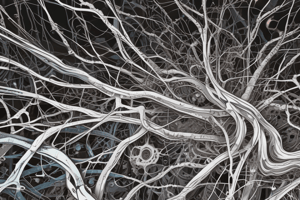Podcast
Questions and Answers
What is Neural Plasticity?
What is Neural Plasticity?
- The process of long-term depression
- The ability to change neural structures or functions by experience (correct)
- A type of synaptic transmission
- The inability of the brain to adapt
What does Synaptic Plasticity refer to?
What does Synaptic Plasticity refer to?
The ability of the synapse to change over time.
Long-term potentiation (LTP) results in a long-lasting strengthening of synaptic connections.
Long-term potentiation (LTP) results in a long-lasting strengthening of synaptic connections.
True (A)
Long-term depression (LTD) increases the strength of synaptic transmission.
Long-term depression (LTD) increases the strength of synaptic transmission.
What happens when long-term depression occurs?
What happens when long-term depression occurs?
What happens when long-term potentiation occurs?
What happens when long-term potentiation occurs?
What is Classical Conditioning?
What is Classical Conditioning?
What is a Neutral Stimulus?
What is a Neutral Stimulus?
What is an Unconditioned Stimulus?
What is an Unconditioned Stimulus?
Flashcards are hidden until you start studying
Study Notes
Neural Plasticity
- Refers to the brain's ability to adapt its neural structure and function based on experiences throughout life.
Synaptic Plasticity
- Describes the synapse's capacity to change over time.
- Can involve growth or formation of new synaptic connections, enhancing synapse strength.
- Disuse may lead to weakening or elimination of synaptic connections.
Long-Term Potentiation (LTP)
- Involves long-lasting strengthening of synaptic connections.
- Leads to enhanced and more effective synaptic transmission.
Long-Term Depression (LTD)
- Represents a long-lasting decrease in synaptic transmission strength, contrary to LTP.
Effects of Long-Term Depression (LTD)
- Occurs due to lack of stimulation in pre- and postsynaptic neurons or prolonged low-level stimulation.
- Results in reduced postsynaptic neuron responsiveness to neurotransmitters, weakening synaptic connections.
Effects of Long-Term Potentiation (LTP)
- Strengthens synaptic connections, making postsynaptic neurons easier to activate.
- Increases postsynaptic neuron responsiveness to presynaptic stimulation by creating more receptor sites for neurotransmitters.
Classical Conditioning
- A learning process through repeated associations between two or more different stimuli.
Neutral Stimulus
- A stimulus that does not naturally provoke any specific response.
Unconditioned Stimulus
- A specific stimulus that innately triggers a reflex response.
Studying That Suits You
Use AI to generate personalized quizzes and flashcards to suit your learning preferences.




